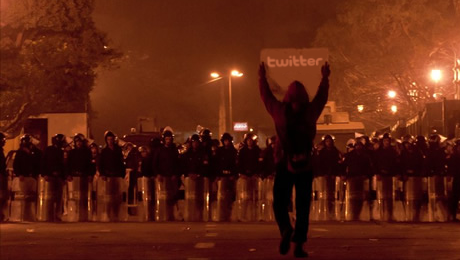Angry students, social media: The perfect storm for revolution

2011 is the year where protests, demonstrations and ultimately revolution was brought to two Middle Eastern and North African countries, namely Tunisia and Egypt. The implications of such will resonate throughout not only the rest of the Gulf and the southern Mediterranean, but for Western democracies and her allies too.
The citizens of Tunisia revolted, and former president Ben Ali was forced into exile. The continuing developments in Egypt suggest a similar path, with further protests planned and a sympathetic military seemingly siding with the citizens.

This year, social media like Facebook and Twitter proved to be a force of change. Whether this force is for short term hardship or long term social reform remains unclear. Nevertheless, the force, strength and potency for social media used by ordinary members of society to bring about extreme, provoking change has tremendous potential.
But social media cannot lead on its own to a revolution, an overthrowing of authority or a callous coup d'état.
As seen in Tunisia and Egypt alike, critical mass is attained by a combination of intellectually minded students, an innate use of a powerful enabling technology to the wider world, and the will and inclination of ordinary, oppressed people.
Only through these catalysts can a perfect storm brew to bring about widespread political and social change. The users of Twitter cannot do this solely on their own.
As the Generation Y are the most densely populated user demographic for social media, this force lays in the very hands of every person under the age of 30 to bring about changes they see as necessary. Ordinary people, including the young, forgotten minority have strength and great power at their hands. And for the most part, it only took two revolutions to prove it.
The instability in Egypt is a matter for great concern for the Western allied nations, as both the United States and the United Kingdom see Egypt as a leader in diplomacy in the Middle East and North Africa.
These demonstrations serve as powerful reminder that not only oppressive regimes are at risk of forceful change, and that no other nation is one hundred percent infallible to the strength of their own people.
Today, one million people on the streets of Egypt will be led in mobile silence, with the Egyptian government turning off all cell networks.
But this will simply provoke already twisted tensions, and only further spur on the cause of the protesters.
Twitter is a force for ordinary citizens to hold to account their governments through unconventional democratic means. As a global service, it concentrates the focus of matters from within a country to the wider world, broadcasting raw and unfettered information and footage to the world outside of its borders.
And as seen in the past week, even with Internet access being turned off and text messaging restricted, people will always find a way around a problem, even if it results in turning to low-tech solutions.
If the Western war on terror had never begun, regardless of the September 11th terrorist attacks on New York - a sentence I never thought I would write, would the Middle Eastern 'Twitter revolution' have been inevitable? Would Saddam have been overthrown by his own people? Could Iran, Syria, and other 'axis of evil' nations fall into the same hands?
It can not be said that Twitter of its own volition, with vast numbers of people using the service, caused the downfall of governments. Twitter is a tool, designed to spread short bursts of information to a vast world of people.